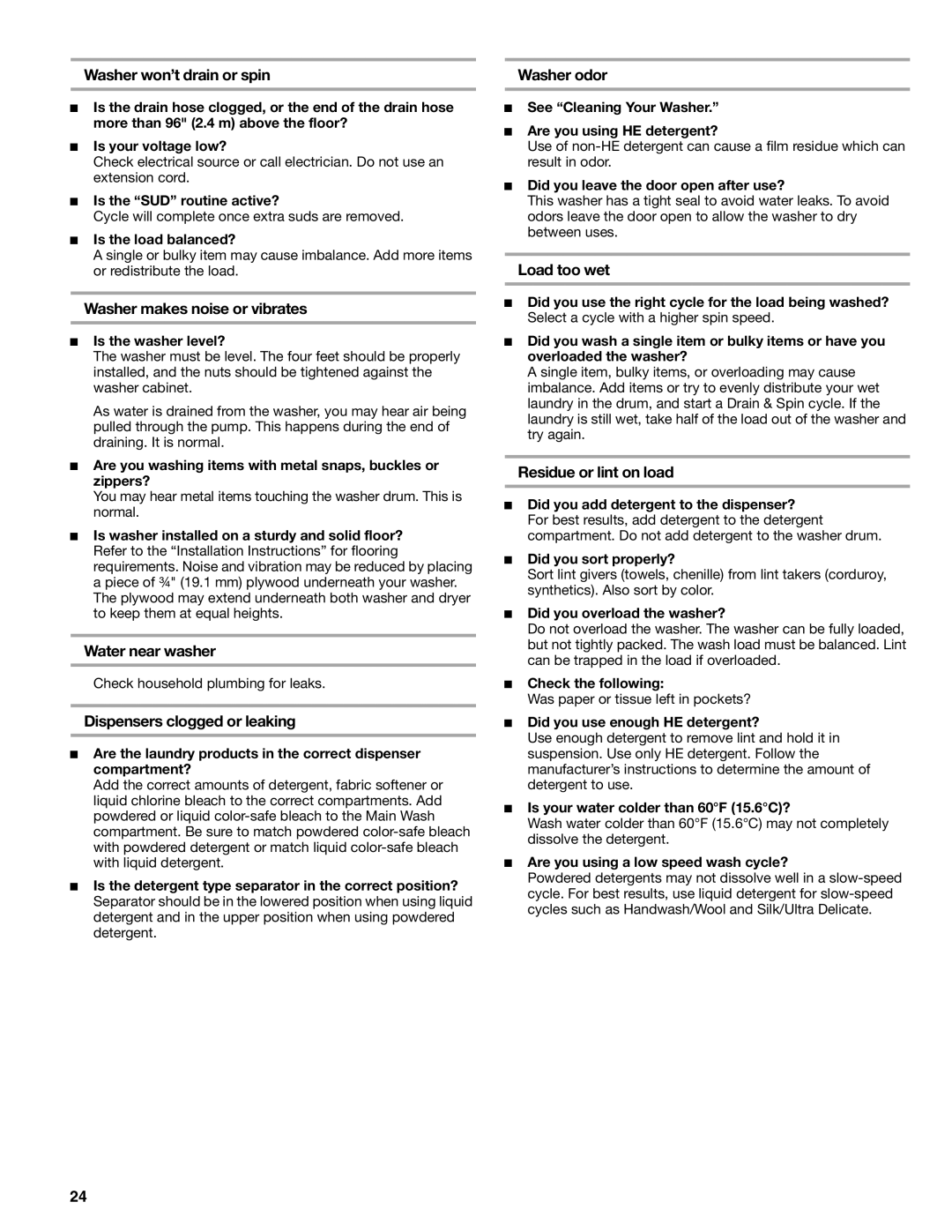
Washer won’t drain or spin |
| Washer odor |
■Is the drain hose clogged, or the end of the drain hose more than 96" (2.4 m) above the floor?
■Is your voltage low?
Check electrical source or call electrician. Do not use an extension cord.
■Is the “SUD” routine active?
Cycle will complete once extra suds are removed.
■Is the load balanced?
A single or bulky item may cause imbalance. Add more items or redistribute the load.
Washer makes noise or vibrates
■Is the washer level?
The washer must be level. The four feet should be properly installed, and the nuts should be tightened against the washer cabinet.
As water is drained from the washer, you may hear air being pulled through the pump. This happens during the end of draining. It is normal.
■Are you washing items with metal snaps, buckles or zippers?
You may hear metal items touching the washer drum. This is normal.
■Is washer installed on a sturdy and solid floor? Refer to the “Installation Instructions” for flooring requirements. Noise and vibration may be reduced by placing a piece of ¾" (19.1 mm) plywood underneath your washer. The plywood may extend underneath both washer and dryer to keep them at equal heights.
Water near washer
Check household plumbing for leaks.
Dispensers clogged or leaking
■Are the laundry products in the correct dispenser compartment?
Add the correct amounts of detergent, fabric softener or liquid chlorine bleach to the correct compartments. Add powdered or liquid
■Is the detergent type separator in the correct position? Separator should be in the lowered position when using liquid detergent and in the upper position when using powdered detergent.
■See “Cleaning Your Washer.”
■Are you using HE detergent?
Use of
■Did you leave the door open after use?
This washer has a tight seal to avoid water leaks. To avoid odors leave the door open to allow the washer to dry between uses.
Load too wet
■Did you use the right cycle for the load being washed? Select a cycle with a higher spin speed.
■Did you wash a single item or bulky items or have you overloaded the washer?
A single item, bulky items, or overloading may cause imbalance. Add items or try to evenly distribute your wet laundry in the drum, and start a Drain & Spin cycle. If the laundry is still wet, take half of the load out of the washer and try again.
Residue or lint on load
■Did you add detergent to the dispenser?
For best results, add detergent to the detergent compartment. Do not add detergent to the washer drum.
■Did you sort properly?
Sort lint givers (towels, chenille) from lint takers (corduroy, synthetics). Also sort by color.
■Did you overload the washer?
Do not overload the washer. The washer can be fully loaded, but not tightly packed. The wash load must be balanced. Lint can be trapped in the load if overloaded.
■Check the following:
Was paper or tissue left in pockets?
■Did you use enough HE detergent?
Use enough detergent to remove lint and hold it in suspension. Use only HE detergent. Follow the manufacturer’s instructions to determine the amount of detergent to use.
■Is your water colder than 60°F (15.6°C)?
Wash water colder than 60°F (15.6°C) may not completely dissolve the detergent.
■Are you using a low speed wash cycle?
Powdered detergents may not dissolve well in a
24
